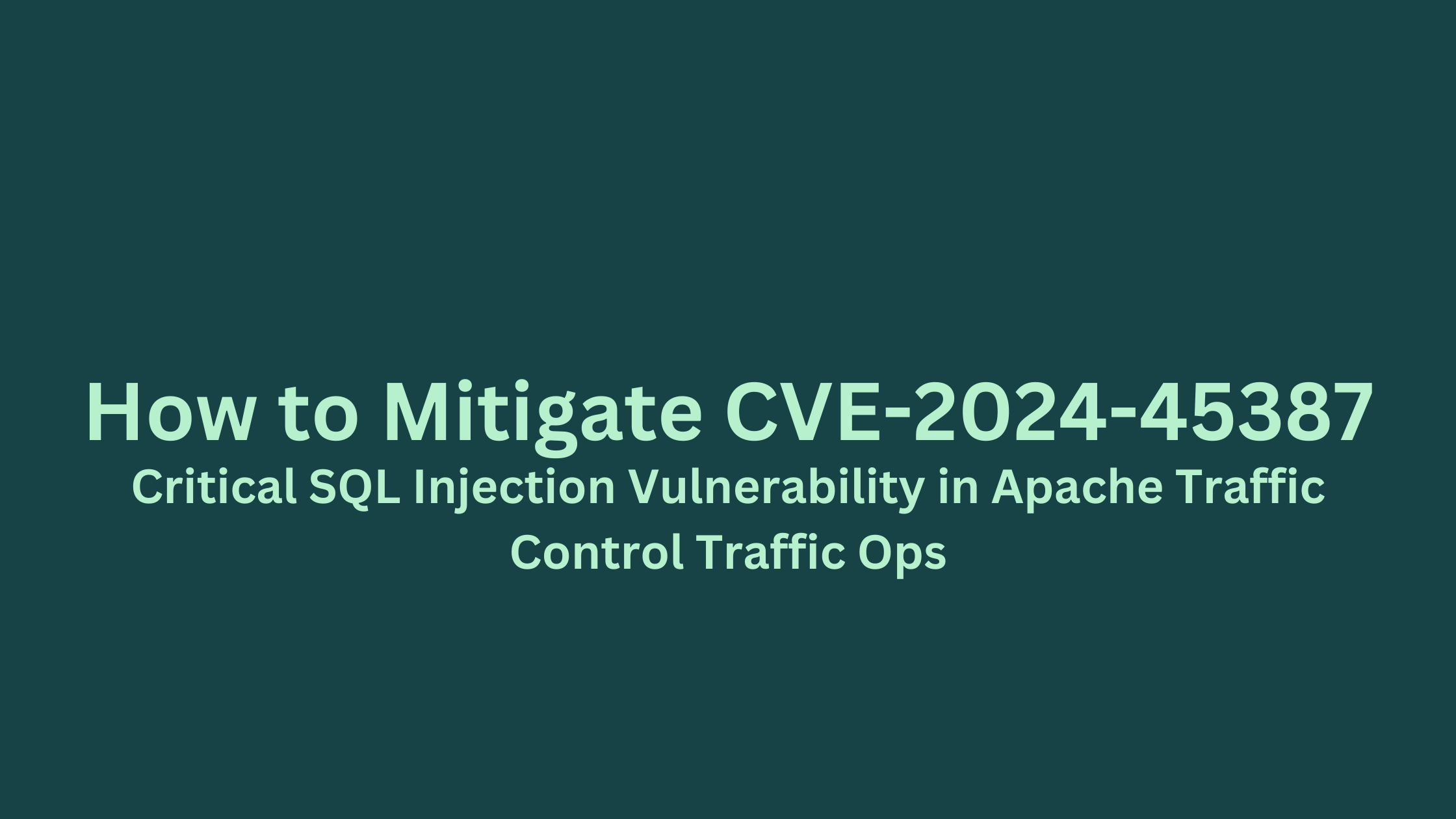Table of Contents
How to Fix CVE-2024-45387: Critical SQL Injection Vulnerability in Apache Traffic Control Traffic Ops
The Apache Software Foundation recently disclosed a critical security vulnerability in Apache Traffic Control Traffic Ops that could allow privileged users to execute arbitrary SQL commands against the database. This SQL injection flaw, tracked as CVE-2024-45387, poses a significant risk to organizations using affected versions of the software. With a maximum CVSS score of 9.9, this vulnerability demands immediate attention from security professionals managing content delivery network (CDN) infrastructure.
Introduction to Apache Traffic Control
Apache Traffic Control is an open-source implementation of a Content Delivery Network (CDN) solution. First announced as a top-level project (TLP) by the Apache Software Foundation in June 2018, it provides a comprehensive platform for managing and optimizing content delivery across distributed network environments. The project enables organizations to create and manage high-performance content distribution networks with enhanced scalability and control.
Summary of the Vulnerability
CVE ID: CVE-2024-45387
Description: SQL injection vulnerability in Traffic Ops
CVSS Score: 9.9 (Critical)
CVSS Vector: CVSS:3.1/AV:N/AC:L/PR:L/UI:N/S:C/C:H/I:H/A:H
The vulnerability affects Apache Traffic Control versions 8.0.0 through 8.0.1, allowing a privileged user with specific roles to execute arbitrary SQL commands against the database. An attacker can exploit this flaw by sending a specially-crafted PUT request to the Traffic Ops interface, potentially compromising the entire database system.
mpact of the Vulnerability
The critical nature of this vulnerability stems from its potential to enable comprehensive database manipulation. Privileged users with roles such as "admin," "federation," "operations," "portal," or "steering" can leverage this flaw to execute unauthorized SQL commands. This could potentially lead to:
Unauthorized data access
Data modification or deletion
Complete compromise of database integrity
Potential exposure of sensitive information
Disruption of CDN operations
Products Affected by the Vulnerability
|
Product
|
Affected Versions
|
Status
|
|---|---|---|
|
Apache Traffic Control
|
8.0.0 - 8.0.1
|
Vulnerable
|
|
Apache Traffic Control
|
7.0.0 (before 8.0.0)
|
Unaffected
|
|
Apache Traffic Control
|
8.0.2 and later
|
Patched
|
How to Check Your Product is Vulnerable?
Check the installed version of Traffic Ops
Verify if the version is between 8.0.0 and 8.0.1
Review user roles with access to the system
Monitor for suspicious database manipulation attempts
Use vulnerability scanning tools to detect potential exploitation
How to Fix the Vulnerability?
Primary Remediation Strategy
1. Immediate Upgrade
Update to Apache Traffic Control version 8.0.2 or later
Follow official Apache Traffic Control upgrade procedures
Ensure complete system backup before upgrading
2. Access Control
Implement strict role-based access controls
Limit privileges for administrative and operational roles
Use principle of least privilege
3. Monitoring and Logging
Enable comprehensive logging for database interactions
Set up real-time alerts for suspicious SQL operations
Regularly audit user activities and access logs
Workarounds
If immediate upgrading is not possible:
Temporarily restrict access to Traffic Ops interface
Implement additional network segmentation
Use web application firewalls (WAF) to filter potentially malicious requests
Vendor Acknowledgment
The vulnerability was discovered and reported by Yuan Luo from Tencent YunDing Security Lab, demonstrating the importance of responsible vulnerability disclosure.
Conclusion
CVE-2024-45387 represents a critical security risk for organizations using Apache Traffic Control. Immediate action is crucial to prevent potential database compromise. Security professionals should prioritize upgrading to the patched version and implementing comprehensive security controls to mitigate this vulnerability.
Found this article interesting? Keep visiting thesecmaster.com, and our social media page on Facebook, LinkedIn, Twitter, Telegram, Tumblr, Medium, and Instagram and subscribe to receive tips like this.
You may also like these articles:
Arun KL
Arun KL is a cybersecurity professional with 15+ years of experience in IT infrastructure, cloud security, vulnerability management, Penetration Testing, security operations, and incident response. He is adept at designing and implementing robust security solutions to safeguard systems and data. Arun holds multiple industry certifications including CCNA, CCNA Security, RHCE, CEH, and AWS Security.
